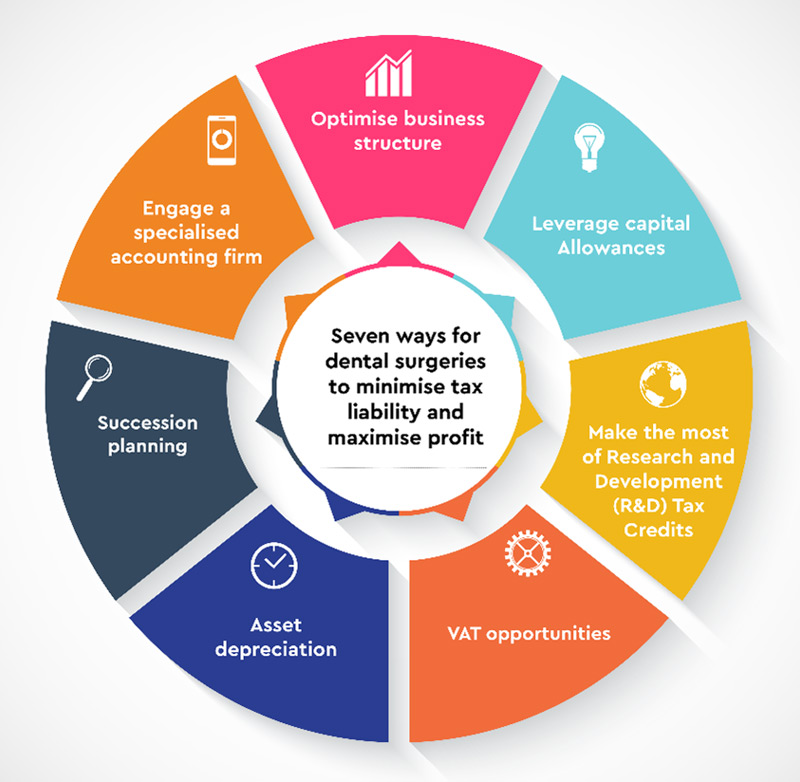Seven ways for dental surgeries to minimise tax liability and maximise profit

Are you running a dental surgery? If so, it's crucial to navigate the complexities of the tax landscape effectively, explains dental accountant KELLYANNE BURCH. By implementing smart tax strategies, you can minimise your liability and maximise your profits, allowing your practice to thrive.
In this article, we will delve into seven effective tax-saving strategies tailored specifically for dental surgeries. These strategies are designed to help you optimise your tax planning, uncover hidden opportunities, and make informed financial decisions.

Optimise business structure
Choosing the right business structure is paramount for tax efficiency. Many dental surgeries operate as sole proprietorships or partnerships, but recently it has become more common to incorporate. Incorporation of dental practices – converting to a limited liability company (LLC) or a limited liability partnership (LLP) – may provide tax advantages. LLCs and LLPs offer liability protection, while allowing you to take advantage of various tax-saving opportunities, such as deductible expenses and potential tax breaks for research and development. You will, however, need to seek professional advice on your circumstances, as incorporation may only have short-term benefits and not fit with your long-term goal.
Leverage capital allowances
Dental surgeries often require significant investments in equipment and technology. By leveraging capital allowances, you can deduct the cost of qualifying assets, such as dental chairs, x-ray machines and practice management software, from your taxable income. Be sure to work closely with your accountant to identify all eligible items and maximum tax relief.
Make the most of Research and Development (R&D) Tax Credits
Dentistry is an evolving field, with constant advances in techniques and materials. If your dental surgery invests in innovative research and development, you may be eligible for R&D tax credits. These credits can significantly reduce your tax liability, providing a financial boost for your practice, while encouraging innovation within the industry. Consult with a specialised tax advisor to determine if your activities qualify for these valuable credits.
Asset depreciation
Dental equipment, furniture and fixtures are considered assets that depreciate over time. Taking advantage of accelerated depreciation methods, such as bonus depreciation or Section 179 deductions, allows you to deduct a significant portion of the asset's cost in the year of purchase rather than spreading it out over several years. This can provide immediate tax savings and improve your cash flow.
Stay abreast of VAT opportunities
Value Added Tax (VAT) can present opportunities for dental surgeries to save money. By understanding the complex VAT rules applicable to the healthcare sector, you can potentially recover VAT on specific expenses, such as laboratory fees, specialist services and certain dental products. Engaging a knowledgeable tax advisor can help you navigate the intricacies of VAT and maximise your reclaims.
Succession planning
Succession planning is crucial for the long-term sustainability of your dental practice. By carefully considering the most tax-efficient methods of transferring ownership, such as utilising business relief or trusts, you can protect your assets and minimise the impact of inheritance tax. Early and strategic succession planning is essential for preserving the value you have built in your dental surgery.
Engage a specialised accounting firm
Navigating the complex tax landscape requires expertise and knowledge. Choosing an accounting firm that specialises in the dental sector, such as a member of NASDAL (National Association of Specialist Dental Accountants and Lawyers), can provide you with the necessary support and guidance to optimise your tax strategies. NASDAL members such as Page Kirk, have extensive experience of working with dental surgeries and offer tailored solutions designed to maximise your tax savings and overall financial performance.
With our deep understanding of industry-specific regulations and tax incentives, we can help you identify hidden opportunities, manage compliance and implement effective tax planning strategies. We are able to offer advice on a wide range of issues relating to your dental business and understand the constraints within which you work. Our membership also gives us the ability to compare your profit and loss account against annual benchmarking data from the NASDAL annual survey. In addition to the usual accountancy and taxation work, we are able to offer advice on how to allocate NHS pensionable income between all the performers in your practice.
It is essential to proactively explore tax-saving strategies that can minimise your tax liability and maximise your profits.
To get in touch with us today to see how we can help you, call 0115 955 5500 or email enquiries@pagekirk.co.uk.
